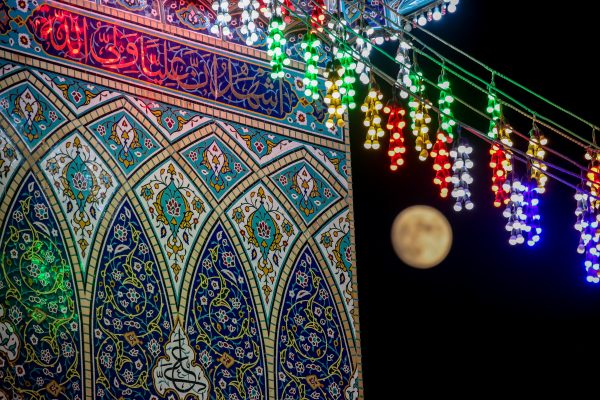The 19th of Ramadan marks a sorrowful event in the history of Islam and indeed a loss for humanity when a brave man was martyred during sujood, the man who had given everything to others, the first of the believers of Islam, the fourth caliph of Islam, The one to receive the title of Mawla in Ghadir e Khum by Prophet (PBUH).
The door of the city of knowledge, the one who forgave his enemies, helped the weak and gave fatherly affections to the orphans of Kufa, the husband of the purest woman, the leader of women in Jannah, the father of leaders of youth in Jannah, Imam Hussain, and Imam Hassan, the one who was the torchbearer of knowledge, peace, bravery, Justice, and the most god-fearing.
In the holy month of Ramadan, on the dawn of the 19th of Ramadan, Imam Ali proceeded to the fajr prayer at the mosque with contentment in his heart and started his prayer with complete absorption in the Dikhr of Allah. At that time Ibn e Muljim attacked Imam Ali with the poisoned sword on his head, and everything in the world became heartbroken except the face of Imam Ali whose passion for martyrdom had come true cried his heart out
Fuzto ya Rabbil Ka’bah”
By the Lord of the Kaaba, I have succeeded!”
And then he said, “By Allah, death has never surprised me, nor has it ever been unwelcome. I was like a boat on the water, seeking and finding.“
(Nahj al-Balagha, Sermons of Imam Ali (AS), Vol. 3, p. 21)
Imam’s Love for Martyrdom
Imam Ali killed nearly more than half of the disbelievers in the battle of Badr; he remained invigorated, unconquerable, and impregnable. Despite his bravery, he yearned for martyrdom in the way of Allah, and after the Uhud battle, he came to Prophet (PBUH) and said
By my father and mother, all praise is due to Allah, who has not seen me turn away from you or flee. By my father and mother, how was I deprived of martyrdom?!”
The Prophet (PBUH) comforted him, saying,
Rejoice, for martyrdom is in your future.”
(Al-Majlisi, Muhammad Baqir, Bihar al-Anwar, Vol. 40, p. 114)
Though his heart yearned for the ultimate sacrifice while participating in numerous battles, fate seemed to withhold this final test of his devotion.
He reminded the Prophet (PBUH) of the promise, to which the Prophet replied,
Indeed, that is true. How, then, can you be patient?”
Imam Ali (peace be upon him) responded,
O Messenger of Allah, this is not a matter of patience, but rather a cause for gratitude and good tidings.”
(Al-Rayshahri, Muhammad, Mizan al-Hikmah, Vol. 5, p. 190)
Hero of Islam: Imam Ali
When Imam Ali was young, he had a wide chest, strong arms, and a brave and shining face. The people of Makkah, older than him, didn’t dare say anything to the Prophet (PBUH) and would run away when they saw Imam Ali protecting him.
Islam, as a religion of peace and tranquility, abhors violence, plunder, and unnecessary bloodshed. However, it mandates strong punishment for those who unjustly take another’s life. In cases where Muslims are attacked by enemies, self-defense, considered a form of Jihad, becomes imperative according to the dictates of wisdom, common sense, and religious law.
All the battles that Prophet Mohammad (PBUH) fought were defensive, and Imam Ali participated in them steadfastly. Imam Ali exemplified unparalleled bravery, faithfulness, and holiness as a warrior. He remained resolute and undaunted, never succumbing to frustration or weariness in the face of battle. Fearless except in the sight of Allah alone, he declared, “By God, if I perceive truth on one side and the entirety of humanity on the other, I would unsheath my sword and confront them alone, undeterred by reproach, in the pursuit of righteousness.”
Imam Ali stood as the epitome of valor, bearing the standard of Islam in numerous battles where his courage became the stuff of legends. Contrary to the typical portrayal of brave men as harsh and eager to shed blood. Imam Ali embodied a unique blend of bravery and compassion. His character radiated kindness, empathy, and warmth, traits uncommon among warriors of his caliber. Renowned battles such as Uhud, Badr, Khandaq, and Khyber witnessed the defense of Islam, with victory consistently achieved through the virtuous leadership of Imam Ali.
Imam Ali: The Father of Orphans.
Once a gift of honey and figs was presented to Ameer ul Momeenin Imam Ali in Kufa during his caliphate. He immediately issued a heartwarming command: gather the city’s orphans. The orphan children were gathered and they were allowed to eat the honey directly from containers. After that honey was distributed to the other people in pots.
People asked why he had allowed the orphans to directly eat hone from containers.
Imam Ali replied,
Indeed, Imam (Ali) is the father of the orphans and he should allow his children to do so so that they never feel like orphans missing their father”
(Bihar al-Anwar, vol. 41,)
He was the father the orphans so desperately needed, a beacon of love and care in a world that could often be cold and unforgiving. His actions spoke volumes, etching a message of compassion and responsibility into the hearts of all who witnessed his selfless act. People saw this and wished they could get the same love from Imam Ali, showing how special his kindness was.
Hence, the well-known story, passed down by narrators and possibly documented in books, holds credibility. It tells of a time when news spread that Imam Ali required milk for his recovery from a poisonous wound. People observed many orphaned children assembling outside Imam Ali’s home, each holding a bowl of milk. The orphans of Kufa didn’t want to lose their father!
Imam’s compassion towards his murderer
When physicians decided that the Imam would not survive the strike of Ibn Muljim, the Imam started to say his last wills to his sons. Bedridden, Imam Ali said to Imams Hasan and Hussain.
I advise you both to fear Allah and that you should not hanker after the pleasures of this world even though it may run after you. Do not be sorry for anything in this world that you have been denied. Speak the truth and act in expectation of reward. Be an enemy of the oppressor and helper of the oppressed.”
Imam Ali exemplified an unparalleled sense of justice, even towards his own murderer. He instructed his family not to enact revenge beyond that, emphasizing that only his killer, ʿAbd al-Raḥmān ibn Muljam Murādī, should face retribution after his death. Moreover, Imam Ali urged his family not to mutilate Ibn Muljam’s body, displaying compassion even in the face of his impending death.
Imam Ali permitted all the visitors to his home despite his suffering. A multitude gathered, expressing their sorrow and shedding tears at his doorstep. Despite enduring immense pain, the Imam urged them “ Ask me before you lose me! However, you may ask as easily as possible because your leader is suffering.”
As the twenty-first night of Ramadan approached, Imam Ali’s suffering intensified as the poison spread throughout his body. His forehead began to sweat, a sign of his impending death. Concerned, his son inquired about the cause of his sweating. He answered,
O son, I have heard the Messenger of Allah (S) saying, ‘When death comes upon a faithful believer, his forehead sweats and his moans calm down.’’





